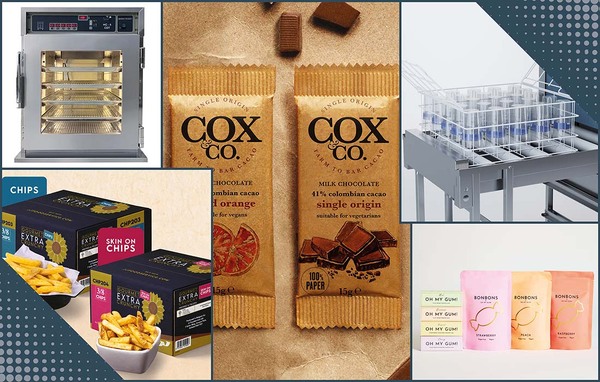Technology Prospectus 2019: Food Safety Management Technology
Restaurateurs and caterers are increasingly recognising the impact of using
software to monitor compliance in key areas in their kitchens, such as cross-contamination and temperature control, rather than using paper records. The Food Standards Agencyâs (FSA) Regulating Our Future initiative aims to modernise the way food businesses in England, Wales and Northern Ireland are regulated â" in real-time where possible â" to ensure that food is safe and that it is what it says it is. These new protocols will increase the need for effective, cutting-edge food safety procedures.
John Barnes, director of consultancy at Enmoore and former head of the FSAâs local delivery division, says: âThe FSA not only wants businesses to be responsible for food safety, they want them to be better at demonstrating their compliance if a regulator visits.
The better your systems are, the better that confidence in your compliance can be.â He adds: âYou can now use software that uploads and reports this information. It is much better. In the past you could record the data checks, but now you can log the information, keep accurate records and analyse it. This
gives more clarity of where your risks are so you can better allocate resources on managing and reducing those risks.â
TAKE CONTROL
One of the main arguments for using food safety technology is to guard against human error, as David Davies, product and marketing director at Checkit, which offers cloud-based solutions, explains: âThe industry has proven approaches to managing food safety based on a system of risk assessments, policies, operational
processes and audits/inspections. These are designed to ensure that the appropriate measures are in place and are adhered to. As with many processes, people are often the weakest link â" whether due to lack of training, attention or external pressures, the reality is that mistakes can and do occur,â he says.
"Restaurants and caterers have systems in place to try to minimise risk at every stage â" making it easy and logical to know what to do, keeping records and addressing issues as they occur, all overlaid by a system of inspections and publicised results. While all of this has traditionally been achieved using paper record-keeping, digital approaches are enabling improvements at all levels.â
For the end-user, smart digital checklists are easy to use and cut the room for error. For supervisors and site managers, they ensure that everyone knows what to do and make handling non-compliances simple. For food safety and business managers, they provide visibility and control, which is especially important for managing a multi-site business.
âFood safety systems are â" at their heart â" a way to make sure that the basics of delivering a quality service are done right, all the time,â says Davies. âThey can easily be extended to other routine activities that are at the heart of operating a quality business, which in turn is the key to running a successful operation.â
Real-time control is an important benefit of this technology. With a traditional system, paper records sit until checked by management or an auditor.
Indications of problems could go unnoticed for days or weeks. With a real-time system, there is rapid visibility of any arising issues or non-compliances, allowing action to be taken before the issue escalates.
âIt allows managers looking after several sites to know where to focus attention and enables easy analysis of recurring issues so that training and operations can be continually updated and improved â" creating a true cycle of continuous improvement,â says Davies.
For operators, then, it means an important change in the way they monitor safety.
Compliance monitoring has previously relied heavily on third parties carrying out physical audits of premises providing a periodic snapshot of the standards within the operation, and included checking of due diligence, which may be several weeks old.
âCheckit allows for continual monitoring â" providing continual feedback,â says Davies. âIn addition, having access to data in a digital format opens up options for greater use of this data â" identifying any trends and providing real insights. As a result it has the potential to transform how these services are delivered, opening the way to more efficiency and better results.â
Davies points out that many allergy issues arise at the end of the food chain, with the communication between the allergy sufferer and the team on-site being a common area for incidents to arise. âThe process of dealing with allergy queries needs to be tightly controlled, and the impact of human error can be huge.
Having a clear process in place to respond to allergy queries is vital. Systems such as Checkit will guide the team through the process, and provide a clear auditable record of the steps that were followed.â
UP IN THE CLOUD
Leicester-based start-up Navitas Food Safety, which estimates that 95% of food businesses are still using paper-based monitoring systems, is another company that has brought its food safety management system onto the cloud, thanks to a £745,000 equity investment from the Midlands Engine Investment Fund.
The food safety system is integrated, rather than a series of digital checklists, and
comprises hardware â" smart probes, hubs and pods â" and software. So, in addition to the temperature monitoring of chilled food in appliances, such as fridges, freezers and chiller cabinets, the system can monitor every
step of food production and service, from delivered goods to cooking to hot-service to serving.
The smart probe is used to check food temperature, while the pods and hubs monitor, record and report in real time the temperature of fridges and freezers. Each of these devices feeds data back to the Navitasâs cloud-based database. The information can be accessed using a bespoke tablet or via any device using the Navitas App.
âIn this way businesses have a centralised overview and control of key food safety metrics in their kitchens that can be accessed around the clock and on the go,â says chief executive Ben Gardner.
âThis technology is important because it provides reassurance to food businesses. It enables them to ensure food quality, reduce food waste and enhance their brand reputation by creating a positive health and safety culture and avoiding food safety issues,â he adds. âIt is consigning paper-based monitoring systems to the waste bin and bringing IoT (the Internet of Things) to commercial kitchens.â
LOOK TO THE FUTURE
Itâs clear that digitised systems enable food companies to meet and exceed the FSAâs stringent protocols around the temperature monitoring of food, from goods inward to the point of service. While chains are mostly benefiting from the technology at the moment, looking ahead, there are likely to be more products suitable for smaller businesses.
Barnes says the future development of AI and more predictive technology will have the potential to reduce risks further. But he adds the food industry needs to be more comfortable about sharing data if it is to get a better idea of where risks in the supply chains are. âBetter technology and the IoT will allow better regulation of the industry and support and improve transparency and public confidence. We are not there yet because industry and regulators are not sharing enough yet. We are trying to get there, but more trust is needed that the information will be used in a responsible way, benefiting both the industry and consumers. It is crunch-time.â
Can food safety technology improve the scores on the doors?
Food safety technology can give guests confidence that restaurateurs are on top of compliance. In addition, one of the three categories that is used to calculate a food businessesâ food hygiene rating is heavily influenced by the due diligence available.
âSoftware is better than folders for recording HACCP checks, records, training and so on at the click of a button,â says consultant John Barnes. âThe regulator will like that and reward it, which will go towards a better score.â
David Davies at Checkit adds: âLarge gaps in due diligence could indicate the food safety management system is ineffective, potentially resulting in a business achieving a food hygiene rating of one. A system such as Checkit helps manage
the due diligence process, addressing gaps in due diligence checks well before
they become significant.â
Opportunity knocks for Blockchain
The recent fatal allergic reactions of two customers at Pret A Manger highlighted the difficulty faced by the different parts of the food and drink industry in tracing allergens, particularly once they have been used to create other ingredients (see The Caterer â" 8 October 2018).
John Barnes, director of consultancy at Enmoore and former head of the FSAâs local delivery division, suggests that Blockchain might one day be a way of tracing ingredients as they change hands to record what comes through the
manufacturer or food chain, but he admits âwe are not there yetâ.
James Flynn, chief technical officer and founder of Primority, believes Blockchain could be the way forward for better farm-to-fork transparency.
Flynn is working on a Blockchain prototype that he hopes will reduce risks for restaurants in future. âWe are creating a digital ledger solution so all the industry can share information about ingredients and the allergens. We want to break
down food safety information silos so that businesses can operate better, and consumer safety and trust can be improved,â he says.
Obviously, when it comes to the food supply chain, knowledge of whether, say, a product has come into contact with peanuts, is crucial. Blockchain technology, which is seeing rapid adoption in other industries, such as finance, works like a distributed ledger, allowing a digital and fixed trail of transactions, an accurate
record of validated information, which can be shared.
âIt is early days for Blockchain, as traceability is limited to single ingredients and itâs not widely used yet, but adoption is growing,â says Flynn. âWe are working on an app that allows all allergens to be recorded on Blockchain by producers and also by consumers. This could help solve the kind of issues recently faced by Pret A Manger. Consumers will be able to easily search a blockchain allergen
database using their phone and fill in any information gaps by taking a picture of the product label. We hope this will become a global database of allergen information.â
At the moment, restaurants and caterers canât easily trace allergens once they have been used to create other ingredients. Flynn points out that, at its
core, this is an information and communication problem, but he says the industry needs to engage with technology to help improve consumer awareness and safety, to prevent problems such as those experienced by Pret A Manger.
An education in monitoring at Bedford School
This independent boys school in Bedford has 400 staff and 1,100 students, aged 7-18, including 300 boarders. Sodexo holds the catering contract, and the task of feeding 1,400 lunches on weekdays and 400 breakfasts and evening meals daily
falls to contract catering team manager Caitlin McArthur and her 52-strong team.
McArthurâs responsibilities include hot-hold, chilling and cooking; cleaning
and deliveries; food hygiene and food standards inspections; and training and
management. The team were carrying out temperature monitoring, general
food safety and other compliance checks manually and paper records were kept.
Full in-depth checks were carried out weekly and any outstanding compliance
issues were addressed when discovered. In cases of simple human error, it meant it could be days before an issue could be identified and fixed.
McArthur installed Checkitâs real-time operations management solution for work management and agreed a two-week handover period whereby it was introduced alongside the existing processes.
âWe put the new systems in place on 7 March. Our environmental health officer
visited on 9 March, during the handover, so he got the chance to see the two systems side-by-side. He was very impressed,â says McArthur. âCheckit creates loads more efficiency and effectiveness and is also environmentally friendly as all the information is held in the cloud.â
Checkitâs automated monitoring also proved itself. A power-cut led to one of the
10 on-site fridges breaking down over the weekend when fewer staff were around to spot the issue. With 1,000-plus mouths to feed, the fridges store thousands of pounds worth of food. Not only would it have been a big financial hit for Sodexo, the inability to provide enough meals could potentially have affected the companyâs reputation. While the catering team couldnât have predicted the loss of power, the Checkit system could alert staff immediately and the food was moved.
As McArthur says: âIt allows us to be much more proactive than the old paper-based system, as previously we wouldnât find out about an issue until after it happened, or even a few days later. With Checkit, we know exactly when it is happening and we can take action straight away.â
Sponsorâs comment: Checkit
Using pen and paper checklists to run food safety, whether in a single-site café or a complex multisite operation, is settling for second best. Itâs not reliable, itâs inefficient and, worst of all, you might not know what you are risking until itâs too late. The same goes for all the other critical tasks that need doing every day.
You would not dream of managing your billing, finance, payroll or customer databases using paper. However, when it comes to tracking and guiding the actual work people do and the status of the equipment, technology has lagged behind.
Thatâs why, at Checkit, we have developed Real-Time Operations Management to
ensure the efficient execution of routine activities â" including food safety tasks.
Our technology and business services provide the visibility and reassurance needed to let our customers run their businesses better with less risk.





















